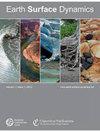Benthos as a key driver of morphological change in coastal regions
IF 2.9
2区 地球科学
Q2 GEOGRAPHY, PHYSICAL
引用次数: 0
Abstract
Abstract. Benthos has long been recognized as an important factor influencing local sediment stability, deposition, and erosion rates. However, its role in long-term (annual to decadal scale) and large-scale coastal morphological change remains largely speculative. This study aims to derive a quantitative understanding of the importance of benthos in the morphological development of a tidal embayment (Jade Bay) as representative of tidal coastal regions. To achieve this, we first applied a machine-learning-aided species abundance model to derive a complete map of benthos (functional groups, abundance, and biomass) in the study area, based on abundance and biomass measurements. The derived data were used to parameterize the benthos effect on sediment stability, erosion rates and deposition rates, erosion and hydrodynamics in a 3-dimensional hydro-eco-morphodynamic model, which was then applied to Jade Bay to hindcast the morphological and sediment change for 2000–2009. Simulation results indicate significantly improved performance with the benthos effect included. Simulations including benthos show consistency with measurements regarding morphological and sediment changes, while abiotic drivers (tides, storm surges) alone result in a reversed pattern in terms of erosion and deposition contrary to measurement. Based on comparisons among scenarios with various combinations of abiotic and biotic factors, we further investigated the level of complexity of the hydro-eco-morphodynamic models that is needed to capture long-term and large-scale coastal morphological development. The accuracy in the parameterization data was crucial for increasing model complexity. When the parameterization uncertainties were high, the increased model complexity decreased the model performance.底栖生物是沿海地区形态变化的主要驱动力
摘要长期以来,人们一直认为底栖生物是影响当地沉积物稳定性、沉积和侵蚀速率的重要因素。然而,底栖生物在长期(年至十年尺度)和大尺度沿岸形态变化中的作用在很大程度上仍然是推测性的。本研究的目的是定量地了解底栖生物在潮汐海湾(翡翠湾)形态发展中的重要作用。为此,我们首先应用机器学习辅助物种丰度模型,在丰度和生物量测量的基础上,绘制了研究区 底栖生物的完整图谱(功能群、丰度和生物量)。得出的数据被用于在三维水文生态形态动力学模型中将底栖生物对沉积物稳定性、侵蚀速率和沉积速率、侵蚀和水动力的影响参数化,然后将该模型应用于翡翠湾,对 2000-2009 年的形态和沉积物变化进行后向预测。模拟结果表明,加入底栖生物效应后,模拟效果明显改善。包含底栖生物的模拟结果显示,形态和沉积物变化与测量结果一致,而非生物驱动因素(潮汐、风暴潮)单独导致的侵蚀和沉积模式与测量结果相反。根据非生物因素和生物因素的不同组合方案之间的比较,我们进一步研究了水文生态形 态动力学模式的复杂程度。参数化数据的准确性是提高模式复杂程度的关键。当参数化的不确定性较高时,模型复杂度的增加会降低模型的性能。
本文章由计算机程序翻译,如有差异,请以英文原文为准。
求助全文
约1分钟内获得全文
求助全文
来源期刊

Earth Surface Dynamics
GEOGRAPHY, PHYSICALGEOSCIENCES, MULTIDISCI-GEOSCIENCES, MULTIDISCIPLINARY
CiteScore
5.40
自引率
5.90%
发文量
56
审稿时长
20 weeks
期刊介绍:
Earth Surface Dynamics (ESurf) is an international scientific journal dedicated to the publication and discussion of high-quality research on the physical, chemical, and biological processes shaping Earth''s surface and their interactions on all scales.
 求助内容:
求助内容: 应助结果提醒方式:
应助结果提醒方式:


